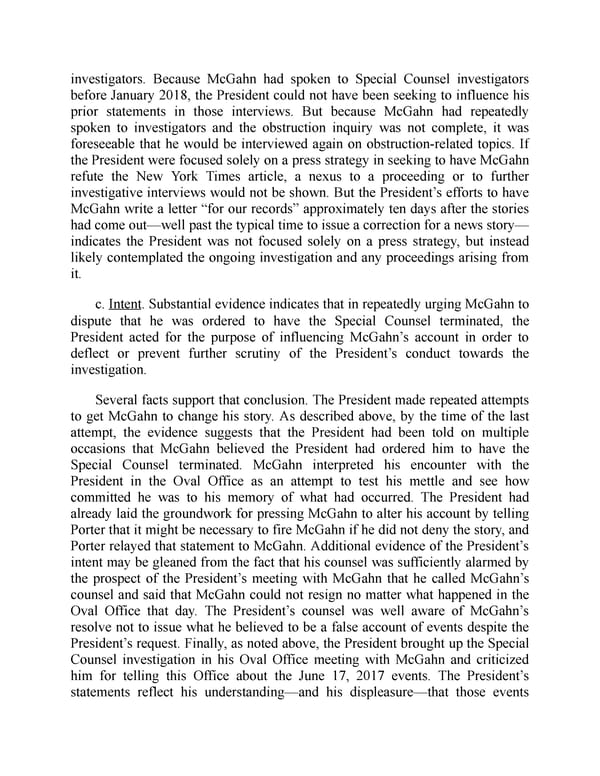investigators. Because McGahn had spoken to Special Counsel investigators before January 2018, the President could not have been seeking to influence his prior statements in those interviews. But because McGahn had repeatedly spoken to investigators and the obstruction inquiry was not complete, it was foreseeable that he would be interviewed again on obstruction-related topics. If the President were focused solely on a press strategy in seeking to have McGahn refute the New York Times article, a nexus to a proceeding or to further investigative interviews would not be shown. But the President’s efforts to have McGahn write a letter “for our records” approximately ten days after the stories had come out—well past the typical time to issue a correction for a news story— indicates the President was not focused solely on a press strategy, but instead likely contemplated the ongoing investigation and any proceedings arising from it. c. Intent. Substantial evidence indicates that in repeatedly urging McGahn to dispute that he was ordered to have the Special Counsel terminated, the President acted for the purpose of influencing McGahn’s account in order to deflect or prevent further scrutiny of the President’s conduct towards the investigation. Several facts support that conclusion. The President made repeated attempts to get McGahn to change his story. As described above, by the time of the last attempt, the evidence suggests that the President had been told on multiple occasions that McGahn believed the President had ordered him to have the Special Counsel terminated. McGahn interpreted his encounter with the President in the Oval Office as an attempt to test his mettle and see how committed he was to his memory of what had occurred. The President had already laid the groundwork for pressing McGahn to alter his account by telling Porter that it might be necessary to fire McGahn if he did not deny the story, and Porter relayed that statement to McGahn. Additional evidence of the President’s intent may be gleaned from the fact that his counsel was sufficiently alarmed by the prospect of the President’s meeting with McGahn that he called McGahn’s counsel and said that McGahn could not resign no matter what happened in the Oval Office that day. The President’s counsel was well aware of McGahn’s resolve not to issue what he believed to be a false account of events despite the President’s request. Finally, as noted above, the President brought up the Special Counsel investigation in his Oval Office meeting with McGahn and criticized him for telling this Office about the June 17, 2017 events. The President’s statements reflect his understanding—and his displeasure—that those events
 Mueller Report PDF Page 385 Page 387
Mueller Report PDF Page 385 Page 387